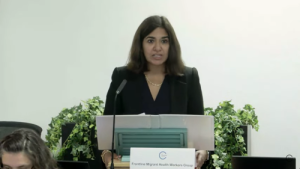PPE and staffing issues left nurses vulnerable, Covid inquiry told

Nurses were placed under “unacceptable risk” during the pandemic, the UK Covid-19 Inquiry has been told.
These risks were highlighted by the Royal College of Nursing (RCN) and the Frontline Migrant Health Workers Group during their opening statements to the inquiry yesterday.
“Healthcare professionals described feeling like lambs to the slaughter”
Fenella Morris
Fenella Morris KC, counsel for the RCN, spoke about the issues with unsafe staffing and personal protective equipment (PPE).
Regarding staffing, she said that the “size and characteristics” of the nursing workforce were “inadequate” to meet the demands of a pandemic.
“The college considers that a workforce crisis was well entrenched in the health and care service before the pandemic struck, and it significantly impacted the ability of the UK to appropriately prepare for the impact the pandemic would have,” said Ms Morris.
What she also described as “inadequate” was the UK’s stocks of PPE and the guidance for its use.
“It placed healthcare workers at unacceptable risk when faced with a novel pathogen,” she said.
“Challenges around distribution, the inequality in supply, and other services were among the main issues.
“Due to those challenges, there were reports that college members had been required to reuse single-use equipment, use equipment previously marked as out of date, clean used gowns with alcohol wipes, and to use alternative equipment which had been donated and which did not meet adequate standards.”
She further cited issues around fit testing for PPE and how a “one-size-fits-all” approach left some women and minority ethnic staff in particular with ill-fitting PPE.
“Healthcare professionals described feeling like lambs to the slaughter,” warned Ms Morris.
In its written submission to the inquiry, the RCN argued that the issues around the provision of PPE were linked to the wrong assumption that the virus was predominantly spread by droplets, rather than being airborne.
Meanwhile, in her oral evidence, Ms Morris also commented more widely on the “heavy burden” that nurses took on during the pandemic and the effects this had on them.
Some nurses carried on working on the frontline “despite particular risks to them as they were pregnant themselves or clinically vulnerable”.
She said nurses worked for extended periods in PPE that “caused damage to them”, they isolated themselves from their families to protect them and went to work when they were unwell.
In terms of long-term effects, as well as mental health issues like post-traumatic stress disorder (PTSD), Ms Morris pointed to the high levels of long Covid among the nursing workforce.
“A workforce as important as the frontline migrant health workers should never be left unprotected again”
Diya Sen Gupta
“Many nurses who contracted long Covid via exposure at work have either lost or are now at risk of losing their employment due to their ongoing health issues and the lack of workplace support to enable them to remain in employment,” she said.
“Evidence shared with the inquiry from the college’s members highlights the feelings of fear, panic and dread and their sense of vulnerability, as well as the emotional and physical toll of dealing with death, pain and suffering daily at levels they had never experienced before.”
Diya Sen Gupta KC, counsel on behalf of the Frontline Migrant Health Workers Group, told the inquiry that migrant nurses working in the UK during the pandemic were “unprotected”.

Diya Sen Gupta
She said figures from the first few months of the pandemic suggested that 53% of the healthcare workers who died in the UK were migrants.
In addition, she said Filipino nurses accounted for 22% of NHS nurse staff deaths despite comprising only 3.8% of the nursing workforce.
Ms Sen Gupta described these as “shocking statistics and, we say, were avoidable”.
She said migrant healthcare staff were more likely to be on the frontline because their visa status was dependent on them being at work and also affected their sick pay entitlements.
In addition, they were not prioritised for PPE or vaccination and were “disproportionately allocated to higher risk working environments”, warned Ms Sen Gupta.
“The disproportionate impact of Covid-19 on ethnic minority, migrant and precariously employed staff was apparent to government from the early stages of the pandemic, yet there appears to have been little, if any, action taken to protect them,” she said.
Like Ms Morris, Ms Sen Gupta highlighted issues around staffing, noting that “austerity policies had left the NHS with severe staff shortages and infrastructure that was not fit for purpose”.
“The NHS’s ability to respond to the pandemic had been constrained by its funding,” she said.
She finished her submission by urging: “A workforce as important as the frontline migrant health workers should never be left unprotected again.”
The submissions from the RCN and Frontline Migrant Health Workers Group came as part of module 3 of the Covid-19 inquiry which is ongoing and focused on the impact of the pandemic on healthcare.






